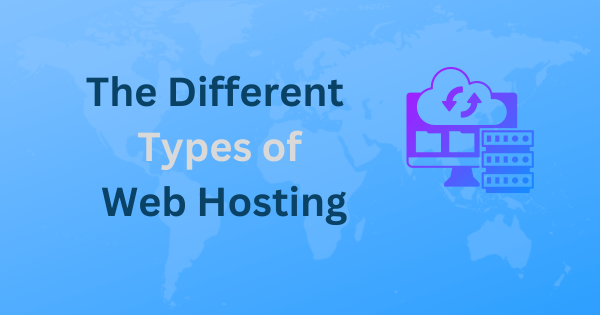The Different Types of Web Hosting – Which One is Right for You?

In today’s digital age, having a strong online presence is crucial for businesses and individuals alike. One of the key components of establishing that presence is choosing the right web hosting solution. With a plethora of options available, it can be perplexing to determine which type of web hosting is best suited for your needs. In this article, we’ll delve into the different types of web hosting and help you navigate through the maze of options to find the one that fits your requirements like a glove.
Table of Contents
The Different Types of Web Hosting
Shared Hosting
Pros and Cons
Shared hosting is one of the most budget-friendly hosting options available. In this setup, multiple websites share the same server resources, such as CPU, RAM, and storage space.
Pros:
- Cost-effective
- User-friendly for beginners
- Managed by the hosting provider
Cons:
- Limited resources
- Performance may suffer during high traffic
Ideal for Whom?
Shared hosting is ideal for individuals or small businesses with minimal website traffic and tight budgets. It’s a great choice for those starting their online journey.
Virtual Private Server (VPS) Hosting
Pros and Cons
Virtual Private Server (VPS) hosting offers a middle ground between shared and dedicated hosting. It involves partitioning a physical server into multiple virtual servers, each with its dedicated resources.
Pros:
- More control and customization
- Better performance than shared hosting
- Scalable
Cons:
- More expensive than shared hosting
Ideal for Whom?
VPS hosting is suitable for businesses that have outgrown shared hosting but don’t require the resources of a dedicated server. It provides more control and flexibility.
Dedicated Hosting
Pros and Cons
Dedicated hosting provides an entire server exclusively for your website. You have full control over server resources and configurations.
Pros:
- Maximum performance and customization
- Enhanced security
- Ideal for resource-intensive websites
Cons:
- High cost
- Requires technical expertise to manage
Ideal for Whom?
Dedicated hosting is ideal for large businesses, e-commerce sites, and applications with high traffic and resource demands.
Cloud Hosting
Pros and Cons
Cloud hosting utilizes a network of virtual servers, making it highly scalable and reliable. Resources are distributed across multiple servers, reducing the risk of downtime.
Pros:
- Scalable and flexible
- Pay-as-you-go pricing
- High reliability
Cons:
- Costs can add up with usage
- May require technical expertise
Ideal for Whom?
Cloud hosting is suitable for businesses with fluctuating traffic and resource needs. It’s a cost-effective option for those who need scalability.
WordPress Hosting
Pros and Cons
WordPress hosting is tailored specifically for WordPress websites, offering optimized performance, security, and support.
Pros:
- Easy WordPress installation and management
- Enhanced security features
- Expert support for WordPress issues
Cons:
- Limited to WordPress websites
- Slightly more expensive than shared hosting
Ideal for Whom?
WordPress hosting is perfect for bloggers, small businesses, and anyone running a WordPress-powered website.
E-commerce Hosting
Pros and Cons
E-commerce hosting is designed for online stores and comes with features like secure payment processing and e-commerce-specific tools.
Pros:
- E-commerce features and integrations
- Enhanced security for online transactions
- Scalable for growing businesses
Cons:
- Can be costly for small businesses
- May require technical expertise
Ideal for Whom?
E-commerce hosting is essential for online retailers and businesses looking to sell products or services online.
Reseller Hosting
Pros and Cons
Reseller hosting allows you to become a hosting provider yourself. You purchase hosting resources and sell them to your clients.
Pros:
- Opportunity for a hosting business
- Full control over client accounts
- Potential for profit
Cons:
- Requires technical knowledge
- Responsibility for client support
Ideal for Whom?
Reseller hosting is suitable for entrepreneurs who want to start their hosting business or web developers managing multiple client websites.
Managed Hosting
Pros and Cons
Managed hosting takes the burden of server management off your shoulders. The hosting provider handles all technical aspects.
Pros:
- No server management required
- Expert support
- Ideal for non-technical users
Cons:
- Higher cost
- Limited customization
Ideal for Whom?
Managed hosting is ideal for businesses and individuals who want a hassle-free hosting experience without the need for technical expertise.
Colocation Hosting
Pros and Cons
Colocation hosting involves renting server space in a data center. You provide the physical server, and the data center takes care of the infrastructure.
Pros:
- Full control over server hardware
- High-level security
- Ideal for large-scale operations
Cons:
- Expensive setup and maintenance
- Requires technical knowledge
Ideal for Whom?
Colocation hosting is suitable for enterprises with specific hardware requirements and the technical capacity to manage their servers.

Factors to Consider When Choosing a Web Hosting Plan
Performance
The speed and reliability of your hosting play a significant role in user experience.
Scalability
Consider whether the hosting solution can accommodate your website’s growth.
Security
Protecting your website and user data is paramount. Look for robust security features.
Customer Support
Responsive and knowledgeable customer support can be a lifesaver in times of trouble.
Cost
Choose a hosting plan that fits your budget but doesn’t compromise on essential features.
FAQs
Shared hosting is an excellent choice for small blogs due to its affordability and simplicity.
Yes, cloud hosting's scalability and reliability make it an ideal choice for e-commerce.
Yes, colocation hosting requires knowledge of server management and hardware.
Yes, most hosting providers offer seamless upgrades as your website grows.
Conclusion
In finality, the classification of web hosting to embrace shall be contingent upon the specifications and capacities of your online platform. For a website with scarce web traffic, shared hosting might prove propitious. Conversely, for a massive enterprise with substantial web traffic, dedicated hosting could be the appropriate choice. It is imperative to reflect on your alternatives meticulously and select the optimal web hosting solution for your website.
